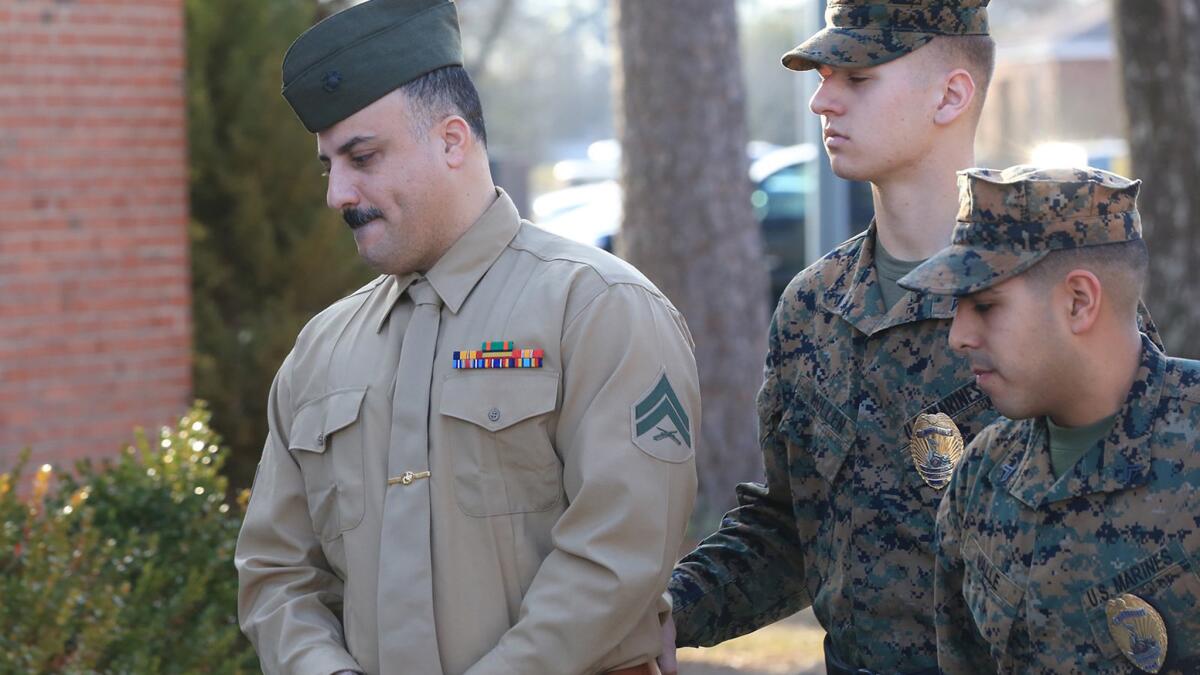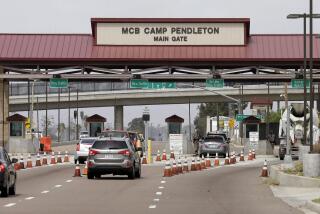Closing arguments heard at Arab American Marine’s court-martial

- Share via
Reporting from Camp Lejeune, N.C. — Disillusioned with the Marine Corps and fearing he would die in combat, an Arab American Marine deserted his unit in Iraq in 2004 and fled to his native Lebanon, a Marine prosecutor told a court-martial Friday.
Marine Cpl. Wassef Ali Hassoun made elaborate preparations, including burning his personal papers and dressing in civilian clothes, before slipping through a remote exit gate at a U.S. military base in Fallouja, Iraq, Marine Capt. Christopher Nassar said in closing arguments.
Hassoun, 35, a native of Lebanon and a naturalized U.S. citizen, is charged with desertion, larceny and destroying government property in connection with two unauthorized absences from his Marine unit and a decade-long life on the run in Lebanon.
He faces 27 years in prison if convicted on all charges.
“He didn’t want to die in Iraq,” Nassar told the court. “He left his fellow Marines behind.”
Hassoun’s lawyer, Haytham Faraj, told a military judge Friday that Hassoun was captured by insurgents and held for 17 days before a tribal sheik negotiated his release. He said fellow Marines, suspicious and skeptical of Hassoun because of his Muslim faith and Arab background, “never gave him the benefit of the doubt.”
Hassoun’s Muslim and Arab identity, Faraj said, “made him an outsider, not a member of the Marine Corps tribe.”
As a result, Faraj said, the Marine Corps built a prosecution based entirely on circumstantial evidence and “presumptions and suppositions.”
“You don’t have any evidence ... nothing, to allow you to conclude that Cpl. Hassoun walked off the base voluntarily,” Faraj told the judge, Maj. Nicholas Martz, who said he would begin deliberations on a verdict Monday.
Hassoun has pleaded guilty to leaving his U.S.-based unit on an unauthorized absence in 2005 but has pleaded not guilty to desertion and other charges. He elected to have his case decided by a judge rather than a military jury.
Hassoun testified for an hour Friday about his decision to flee the U.S. for Lebanon while on leave in late December 2004 and early January 2005. He had been returned to the U.S. by the American Embassy in Beirut the previous summer after he showed up there, unharmed, more than two weeks after he disappeared from Fallouja in June 2004.
Hassoun was awaiting trial on desertion charges when he was granted a Christmas leave that year to visit his family in Utah, only to flee back to Lebanon via Canada, he admitted. He lived in Lebanon with his wife for nearly a decade, fathering two children in that time, before he turned himself in to military investigators last June.
The court did not allow Hassoun to testify about his disappearance from Fallouja. Faraj, his lawyer, said that Hassoun was kidnapped by the Iraq National Islamic Resistance and that Hassoun’s passport, military ID cards and other possessions were later found in an abandoned building in Fallouja once occupied by the group.
A video emerged in 2004 showing a man raising a sword over the head of a blindfolded Hassoun, but it was not shown at the court-martial.
Hassoun testified that he could not leave Lebanon because Lebanese authorities had confiscated his passport and placed him under travel restrictions after the U.S. sought his extradition. He said he was prosecuted in Lebanese courts in a case that dragged on from 2005 to 2013.
Hassoun admitted that he never contacted his unit during his time in Lebanon. “There was no need for me to contact them because they knew what was going on,” he testified under questioning by his lawyer.
Nor did he contact authorities at the U.S. Embassy, Hassoun testified. “I didn’t think they could help me with the issues I was having,” he said, referring to his legal troubles.
Faraj portrayed Hassoun as a loyal Marine who was nearly killed during battles with insurgents and performed a valuable service as an interpreter for U.S. interrogators.
Prosecutors described Hassoun as “disgruntled,” saying he was angry that his deployment had been extended and that he was unable to visit his new wife in Lebanon. They said he raised the suspicion of fellow Marines by openly declaring his intent to flee to Lebanon, and by spending long periods with Iraqis and other Arab civilians working on the Fallouja base.
“I can’t handle it anymore ... I’ll leave. I’ll go to Lebanon,” prosecutor Nassar quoted Hassoun as saying.
Nassar said Hassoun’s brother bragged about helping the corporal get out of Iraq and into Lebanon through the Hassoun family’s ties to a smuggling network. Faraj accused prosecutors of engaging in a “disgusting ... defamation of the Hassoun family.”
Hassoun has been held in a military brig for seven months. The larceny and destruction of government property charges stem from accusations that he illegally took his military-issue M9 pistol when he disappeared from the Fallouja base, and never returned it.
Nassar said Hassoun deserted his unit “not once, but twice” and spent 10 years on the run because he could not face combat or the discipline and self-sacrifice required of Marines.
“Now is the time that running stops,” Nassar told the court. “Now is the time for him to be held accountable.”
Follow @davidzucchino for national news
More to Read
Sign up for Essential California
The most important California stories and recommendations in your inbox every morning.
You may occasionally receive promotional content from the Los Angeles Times.











